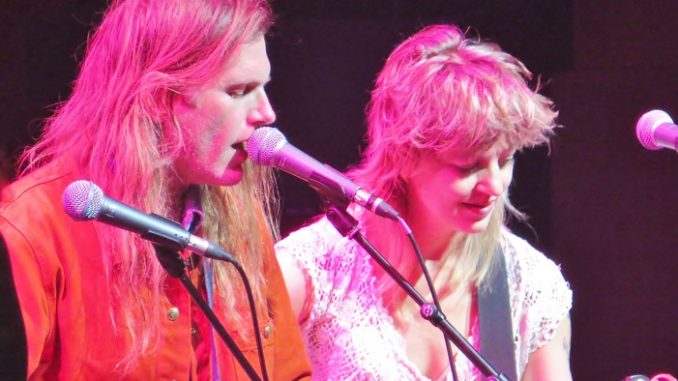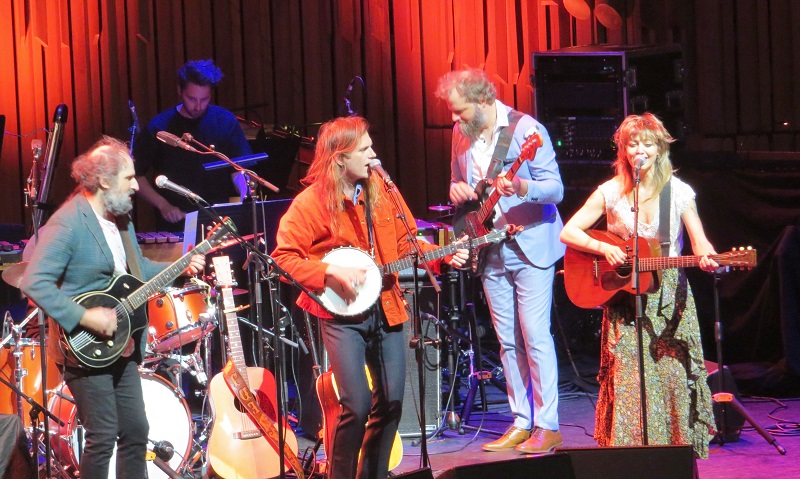
It’s quite a thought that in early 2020 Bonny Light Horseman (Anaïs Mitchell, Eric D. Johnson, Josh Kaufman) could be found playing in The Lexington – a lovely place in many ways, but on no one’s list of large venues. It was clear from the start that this group had something very special about them, with Kaufman’s imaginative guitar playing and Johnson’s world-weary and yet optimistic vocals contrasting with Mitchell’s clear and expressive vocals. Their debut album gave English folk a new sound – a slightly Fruitbats sound perhaps but that’s certainly nothing to be upset about – and the follow-up release of ‘Rolling Golden Holy’ opened things up with more of a reliance on band-written songs and a more American feel to the Americana on show. Considering that there has been a pandemic in between it’s remarkable, and incredibly pleasing, that their sound has been taken up – earlier this year there were back-to-back sold-out gigs at The Union Chapel, and here we are in The Barbican, sold out again and with an Orchestra to add a full rich sound to the music of Bonny Light Horseman.
The London Contemporary Orchestra is no small group of players and they had claimed the majority of the stage, with Bonny Light Horseman grouped together on stage left, which served to emphasize that this was a true collaboration – the new arrangements and music written by Bryce Dessner were an integral part of the performance, not just some prettying up and bulking out of the sound. It also emphasizes a close-knit collaboration – it was after all Bryce Dessner’s brother Aaron (along with Justin Vernon) who helped get Bonny Light Horseman together for the Eaux Claires festival in 2018.

The band took the stage – Johnson limber and unshaven, Kaufman with the air of a counter-culture inclining academic and Mitchell embracing her inner-Stevie Nicks – and opened proceedings in the most beautiful way imaginable – the opening songs of the most recent album, first ‘Exile‘ and then ‘Comrade Sweetheart’. They are gorgeously seductive – over the gentlest banjo melodies ‘Exile‘ opens with “Love, love, love – the beating of my heart” and there’s that instant Laurel Canyon hit as Anaïs Mitchell and Eric D. Johnson demonstrate what duetting should be – so perfectly in sync’ with each other and clearly enjoying the experience of singing these songs – there’s no going through the motions here. As Mitchell opens ‘Comrade Sweetheart‘ it’s easy to see the attraction of such a pairing of appellations – to have someone who is both things, a true comrade, a true sweetheart.
Although the orchestra was present on most of the songs performed on this night there were a couple of what one could call band only interludes – such as the superb ‘Green Green Rocky Road‘ – which allowed the band to just be themselves and in particular for Josh Kaufman’s guitar to be more present. If there was one weakness to this “big band” arrangement it was that there was less space for Kaufman to soar – but oh, when he did it was sublime. Bonny Light Horseman as a five piece take their folk and folk influenced songs and shake them down spectacularly for the 21st century – it’s exciting and thrilling in the way that ‘Liege & Lief‘ era Fairport Convention must have been with the added American rock touches that sometimes hint at the Grateful Dead’s reinvention of similar songs. The folk gospel counting song of ‘Jane, Jane‘, also pulled everything down to the intimacy of the five piece band and it was as if we were transported to some ’60’s coffee house folk evening – or sitting around some Newport festival folk song campfire.

On the other hand it is unarguable that it doesn’t get much better than Anaïs Mitchell singing the lead on the gentle love ballad ‘Fleur De Lis‘ whilst carried along predominantly by the LCO’s string section, counterpointed by Josh Kaufman’s subtle guitar playing. And then, on yet another hand, there were songs where Kaufman’s strident guitar set off in time with the orchestra, who, he’d jocularly noted, do have to sometimes wait for the band, saying: “You guys don’t have to tune between songs, it’s amazing.” Such a combination, as on ‘Cold Rain And Snow‘, had power – the song taking on another dimension of dread, a testament to Dessner’s arrangements.
‘California‘ gained the sweetest violin introduction adding to the hazy and laid back feel on this song of regretful loss which just served to emphasize that good as the band’s eponymous debut had been they had resolved with ease the “difficult second album” syndrome with ‘Rolling Golden Holy‘. Not that the first album was neglected – ‘Blackwaterside‘ softly oozed with the suppressed anger at a betrayal, whilst the song that Anaïs Mitchell described as a “a song based on old texts, but also on the plot of an 80’s romance” gave yet another magical moment: ‘The Roving‘ was all strings and wind section whilst the blending of three vocals brought yet another band to mind – does three harmonizing vocals and a guitar wizard ring any bells?

This was the last of several orchestral gigs for Bobby Light Horseman – they’d been supported by the RTE Concert Orchestra in Ireland, also under the direction of Robert Ames – which naturally enough leads to speculation of a less than happy direction. There is something of a triumphant celebration about a concert with a full orchestra, a pinnacle moment even. Bonny Light Horseman’s is such a precious music – and the band’s participants are such busy people elsewhere – that there had been after the first album a fear that they’d be a one-off supergroup, a fear that ‘Rolling Golden Holy‘ put paid to. And fortunately Eric Johnson was also able to assuage any fears that Bonny Light Horseman were now planning to go out on a high-note, as he explained that this night was effectively the last night of the ‘Rolling Golden Holy‘ tour – but they were already working on a new album. The unasked question remained unanswered though – but one assumes that there will be a live release from these concerts at some point.

The single encore of, naturally, ‘Bonny Light Horseman‘ arrived with a new orchestral introduction that plucked at the pastoral – somewhere not too far distant from Canteloube’s Songs of the Auvergne – before Eric Johnson’s harp and Anaïs Mitchell’s expressive voice, and even more expressive hand gestures lead us through a perfect rendition of the individual woe’s that arose from Napoleon’s grandiose wars. Beautifully it played out with the first violin carrying the refrain coming to a moment of silence before the lengthy standing ovation that greeted the final farewells. And it had been, for certain, a memorable gig and a surely unlikely to be repeated too soon ensemble performance. But here’s to the next time, and the next evolution of what one can safely describe as the leading folk-rock band of the decade.


